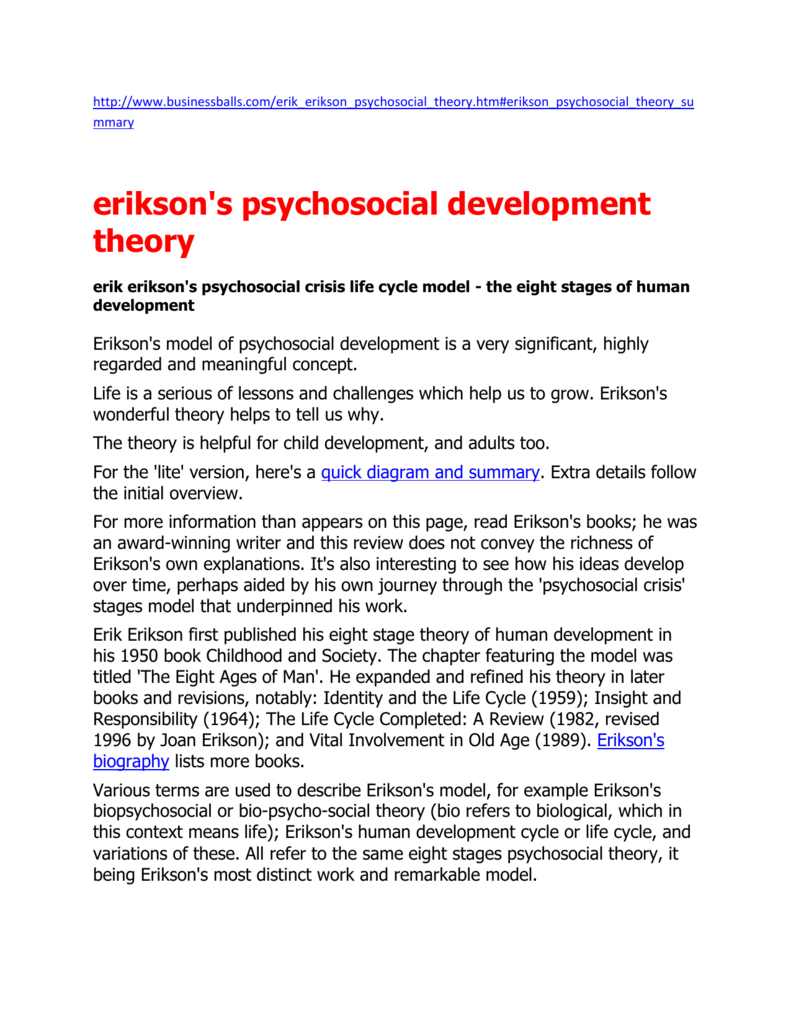Each stage is a challenge or crisis that must be resolved before going to another stage. A baby can develop trust if the mother is there when the baby.

Erikson Stages Chart Developmental stage theories During each one
The first stage of erikson's theory of psychosocial development.

Describe erikson's stages of psychosocial development. 8 rows stage 1: For each of the eight stages: Identity versus confusion is the fifth stage in erikson’s theory of psychological development.
This is the stage in which an infant can develop basic trust if dependability is met, or distrust if the conditions are not met. Kids learn that their environment is safe and trustworthy when they are in this stage. According to erik erikson's theory of psychosocial development, the healthiest way to complete the sixth developmental stage is to find a partner, develop confidence, and contribute to society.
Teenagers develop a sense of personal identity during this particular stage. 8 rows erikson maintained that personality develops in a predetermined order through eight stages of. Erikson’s stages of psychosocial development is a theory introduced in the 1950s by the psychologist and psychoanalyst erik erikson.
Each of the eight erikson stages is characterized by two contradictory emotional forces known as contrary. He argued that social experience was valuable throughout life, with each stage recognizable by the specific conflict we encounter between our psychological needs and the. Erikson’s psychosocial theory is a way of learning about people.
Erikson’s stages of psychosocial development is a theory introduced in the 1950s by the psychologist and psychoanalyst erik erikson. Then, describe how the development of your chosen character was impacted either positively or negatively within. It built upon freud’s theory of psychosexual development by drawing parallels in childhood stages while expanding it to include the influence of social dynamics as well as the extension of psychosocial development into adulthood.
It was the adolescence stage that first piqued erikson’s interest, which led to the analysis of all stages of development. Development of one's identity is not concluded at the end of adolescence. The uniqueness of erikson’s theory lies in the fact that he was the first to propose that human personality develops in a predetermined manner through 8 sequential stages of.
Erik erikson believed that childhood is very important in personality development. The adolescence stage begins at puberty and lasts until one is fully an adult, between 18 and 20 years old. He developed a theory of psychosocial development that covers an entire life.
8 rows psychosocial development is just a fancy phrase that refers to how a person’s individual needs. It occurs during the teenage period (age 12 to 18), which is often turbulent as well as tumultuous. Instead of focusing on cognitive development, however, he was interested in how children socialize and how this affects their sense of self.
Finally, erikson theorized the late adulthood stage of life as defined by a conflict between ego integrity and despair.adults at this stage, usually over age 65, feel content if. Consider erikson’s stages of psychosocial development. Baumrind’s parenting styles, ainsworth’s attachment theory, erikson’s psychosocial stages of development, or kohlberg’s theory on moral development.
The first stage in this theory is called the trust vs. (1) identify key features of the stage (2) describe a scenario of crises that could occur in those stages (3) discuss potential outcomes for successful and unsuccessful resolution for. It built upon freud’s theory of psychosexual development by drawing parallels in childhood stages while expanding it to include the influence of social dynamics as well as the extension of psychosocial development into adulthood.[1] it.
First, choose one of these frameworks and briefly explain its components: Get through his initial five stages and we will be an adult. In this stage we are impacted the most by our mothers.
Erik erikson’s psychosocial development theory proposed that throughout our lives, we encounter certain crises that contribute to our psychosocial development. According to the theory, successful. This stage occurs during the first year of life and is seen as the child’s developing trust in their caregivers.
Stage one (1), is trust vs. He presented these crises as 8 stages of psychosocial conflicts, often known as the 8 erikson stages. When they achieve an ideal balance of individual initiative and the willingness to work with others, they develop a sense of purpose.
Adulthood consists of three basic conflict stages: Erik erikson’s (1958, 1963) psychosocial development theory proposes that our personality develops through eight stages, from infancy to old age. It’s important for people to choose relationships carefully during this stage in order to reduce loneliness, anxiety, and negative influences.
During each of erikson's eight development stages, two conflicting ideas must be resolved successfully in order for a person to become a confident, contributing member of society. Erikson's stages of psychosocial development, as articulated in the second half of the 20th century by erik erikson in collaboration with joan erikson, is a comprehensive psychoanalytic theory that identifies a series of eight stages that a healthy developing individual should pass through from infancy to late adulthood.according to erikson's theory the results from each. Erikson’s theory of psychosocial development has eight distinct stage, each with two possible outcomes.